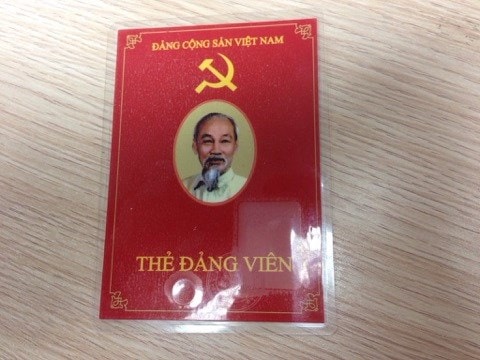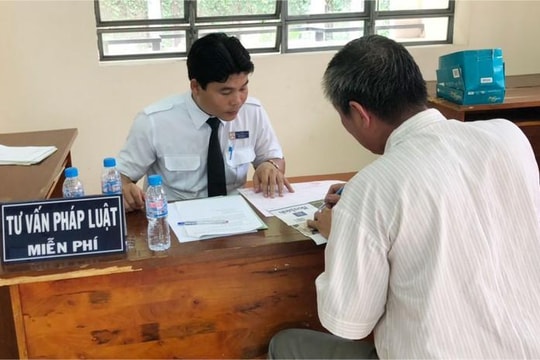Politburo's regulations on disciplinary action against party members who violate
Mr. Tran Quoc Vuong, Politburo member, Standing member of the Secretariat, Chairman of the Central Inspection Commission, on behalf of the Politburo, signed and issued Regulation 102-QD/TW on disciplinary action against violating Party members.
 |
| Illustration photo. (Source: Vietnam+) |
The regulation, consisting of 5 chapters and 37 articles, replaces Regulation No. 181-QD/TW, dated March 30, 2013 of the 11th Politburo on disciplinary action against violating party members.
Compared with Regulation 181-QD/TW, Regulation 102-QD/TW increases by 1 article.
This regulation stipulates the content of violations and disciplinary measures for Party members who violate the Political Platform, Party Charter, resolutions, directives, regulations, decisions, statutes, conclusions of the Party, State laws, charters, resolutions, regulations of the Fatherland Front and socio-political organizations, agencies, and units.
In case a Party member violates the contents not included in this Regulation, the provisions of the Party Charter, the laws of the State and this Regulation shall be applied to handle disciplinary action appropriately.
Party members who are found to have committed violations after transferring jobs, quitting their jobs or retiring must still be examined and concluded; if the violation is serious enough to require disciplinary action, disciplinary action must be taken in accordance with the provisions of the Party Charter, the laws of the State and the contents stated in this Regulation.
All party members are equal before party discipline.
All Party members are equal before Party discipline. Party members in any position, if they violate Party discipline, must be reviewed and disciplined strictly and promptly. Disciplinary action against violating Party members must be carried out in accordance with the direction, motto, principles, procedures and authority prescribed by the Party Charter, regulations and instructions of the Central Executive Committee, the Politburo, the Secretariat and the Central Inspection Commission.
The regulation clearly states that when considering and disciplining party members who violate the law, it is necessary to base on the content, nature, level, harm, cause of the violation, aggravating or mitigating circumstances, attitude towards accepting criticism and correcting and overcoming shortcomings, violations, consequences caused, goals and requirements of performing political tasks and Party building work.
In handling discipline, it is necessary to combine the results of self-criticism and criticism with the results of the party organization's investigation and verification to ensure democratic, objective, honest, complete and accurate conclusions. It is necessary to clarify the causes, distinguish between mistakes and shortcomings of party members due to their qualifications, capacity or motives for the common good or for personal or local interests that intentionally violate; temporary or systematic violations; having been educated, reminded and prevented but still violating; poor self-criticism and criticism awareness, not voluntarily admitting mistakes, not fully and promptly compensating materially; having behaviors that deal with, cause difficulties and obstacles to the inspection; distinguish between party members who initiate, organize and decide and party members who are incited, enticed and agree to do wrong.
For official party members, disciplinary measures include: reprimand, warning, dismissal, and expulsion. For probationary party members, disciplinary measures include: reprimand and warning. Party members who violate to the extent of being expelled must be expelled, and their names will not be removed; Party committee members who violate to the extent of being dismissed must be dismissed, and their names will not be removed from their positions; probationary party members who violate to the extent of being disciplined must be reprimanded or warned, and those who are not qualified must have their names removed from the list of party members.
Party members who violate the law to the extent that they must be prosecuted for criminal liability must be prosecuted, not "handled internally"; if sentenced by a court to a sentence of non-custodial reform or higher, they must be expelled; if they are sentenced to a sentence lower than non-custodial reform or are exempted from criminal liability or are subject to administrative sanctions, then depending on the content, level, nature, harm, cause of the violation and aggravating or mitigating circumstances, party discipline will be considered and implemented appropriately.
Party discipline does not replace other forms of discipline.
According to the Regulations, Party discipline does not replace administrative discipline, organization discipline and other forms of legal handling. If a Party member is subject to Party discipline, the Party Committee managing that Party member must promptly direct or immediately request competent state organizations and socio-political organizations, within 30 working days from the date of announcement of the Party discipline decision, to consider and handle administrative and organization discipline (if any) in accordance with the regulations of the state agency and the organization's charter.
When state agencies, the Fatherland Front, or socio-political organizations suspend work, prosecute, or discipline cadres, union members, or union members who are Party members, they must immediately notify in writing the Party organization that manages that Party member.
No later than 30 working days from the date of receipt of the notice, the Party organization managing the Party member must consider and handle Party disciplinary action.
A violation shall be disciplined only once with one form of discipline. During the time of inspection and consideration of the case, if a Party member commits two or more violations, each violation shall be considered, concluded, and a general decision shall be made on one form of discipline; each violation of a Party member shall not be separated to be disciplined multiple times with different forms of discipline. In the same case where multiple Party members commit violations, each Party member shall be disciplined for his/her own violation.
When a competent party organization wrongly or incorrectly disciplines a party member, it must proactively change or cancel that decision. If a party organization has decided to discipline a party member and that party organization violates the process of considering and handling the discipline to the extent that disciplinary action is required, the Party Committee or the Standing Committee of a higher-level Party Committee shall consider and decide.
After one year from the date of announcement of the disciplinary decision or the decision to resolve the disciplinary complaint (except for the disciplinary decision of expulsion), if the Party member does not appeal, does not re-offend or commits any new violation to the extent that disciplinary action is required, the disciplinary decision will automatically expire. The disciplinary decision shall not be transferred, appointed, conferred, promoted in military rank; conferred, awarded, or recognized with titles of the Party and State on Party members who are being considered and disciplined by a competent Party organization.
Clearly define disciplinary measures for 3 types of violations
The Regulation clearly states specific disciplinary measures for each type of violation: regarding politics and principles of Party organization and activities; regarding State policies and laws; regarding responsibility regime, lifestyle ethics, beliefs and religions; for each case of violation causing less serious consequences, causing serious consequences and causing very serious consequences.
Violations of politics and principles of Party organization and activities include: Violations of political views and internal politics; violations of the principle of democratic centralism; violations of election regulations; violations of propaganda and speech; violations in organizational and personnel work; violations of regulations on protecting Party and State secrets.
Violations of State policies and laws include: Violations in crime prevention and control; violations in inspection, examination and auditing activities; violations in complaints, denunciations and settlement of complaints and denunciations; in preventing and combating corruption and waste; violations of regulations in investment and construction; in the fields of finance and banking; in management and use of support, sponsorship, humanitarian and charity funds; in implementation of social security policies; violations of regulations on land and housing; management, issuance and use of diplomas and certificates; establishment and activities of associations; demonstrations and mass gatherings causing insecurity and disorder; violations of regulations on marriage and family; marriage with foreigners; relations with foreign organizations and individuals; population policies and family planning; professional ethics in the health sector.
Violations of the responsibility regime, ethics, lifestyle, beliefs and religions include violations in leadership, direction, management and operation; in the performance of duties, tasks and public service; in social evils; in domestic violence; in ethics and civilized lifestyle; in beliefs and religions.
Violations are considered for a reduced level of discipline when there is one or several of the following circumstances: proactively reporting one's violations to the organization, voluntarily admitting shortcomings and violations before being discovered; proactively reporting, providing information, fully and honestly reflecting on co-violating people; proactively remedying the consequences of violations and actively participating in preventing violations; proactively compensating for damages, remedying the consequences caused by oneself; violating due to objective reasons or being forced but proactively reporting to the organization; violating due to having to carry out wrongful policies, decisions, and orders of superiors.
Violations must be considered for increased disciplinary action when there is one or more of the following circumstances: Having been educated or warned by a competent organization or individual but not correcting; being evasive, concealing or not voluntarily admitting shortcomings or violations; covering up for other violators; suppressing or taking revenge on those who fight against or denounce violations or those who provide evidence of violations; providing false information or reports; preventing others from providing evidence of violations; altering or destroying evidence, creating fake records or evidence; dealing with, obstructing, causing difficulties or obstacles in the process of inspection, supervision, supervision, audit, investigation, examination, verification, and collection of evidence of violations.
In addition, there are a number of other circumstances such as violations due to taking advantage of emergency situations, natural disasters, implementation of social, security and defense policies; violations causing material damage that must be compensated but not compensated or remedied; violations that are repeated, systematic, and subject to disciplinary action many times; organized violations; being the mastermind or initiator of violations; forcing, mobilizing, organizing, or assisting others in committing violations; forcing, instructing, or facilitating others to create fake documents, records, or evidence; concealing, altering, or destroying evidence, records, or documents.
Regulations issued on November 15, 2017./.
According to Vietnamplus
| RELATED NEWS |
|---|

.jpg)



.jpg)
.jpg)
